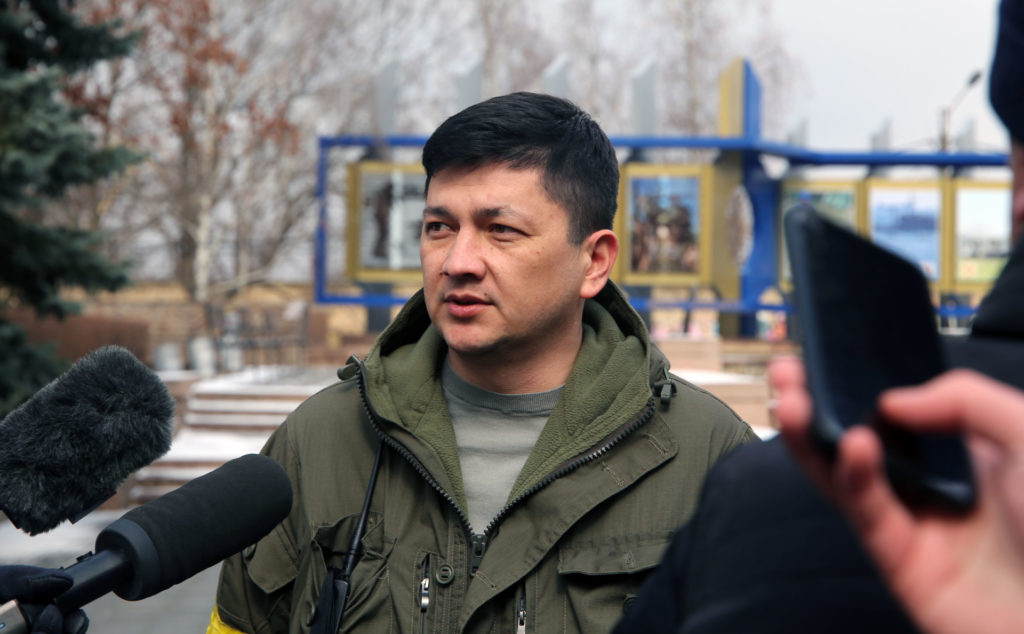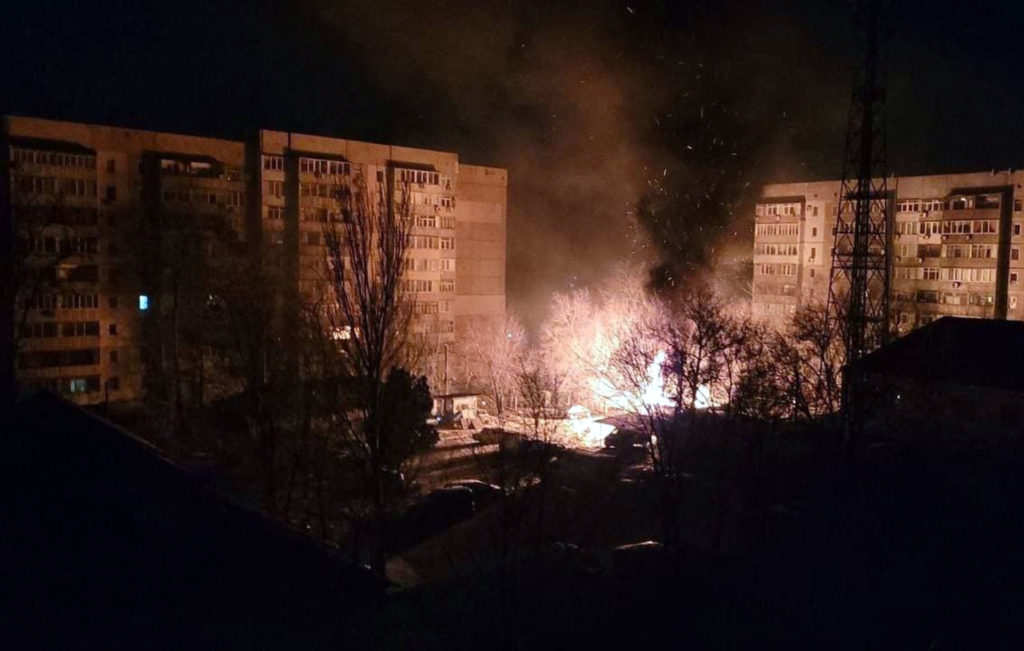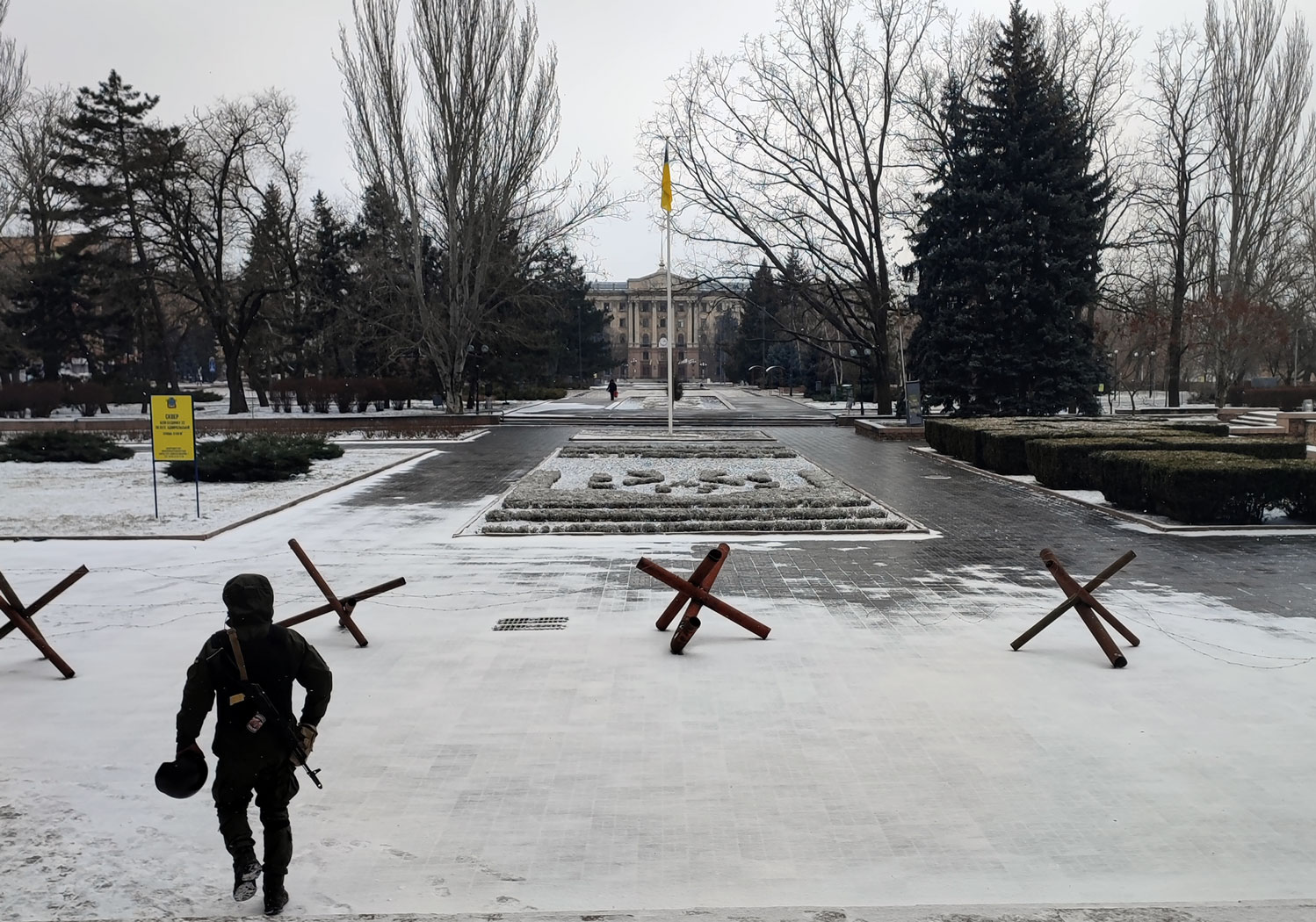Ina Trofimenko, 47, is lying in a hospital bed in City Hospital in central Mykolaiv, her leg covered in bandages, and shows a small piece of cloth with a fragment of a bomb that has just been removed from her leg in an operation. Just four days ago, a bomb exploded in their yard in the village of Voskresensk, on the outskirts of this strategic port city in southern Ukraine. There was no military presence nearby that they were aware of, but the Kremlin’s forces have been indiscriminate in their attacks on Ukrainian civilian targets in recent weeks.
Her husband Sergey, also 47, had a metal grill sticking out of his foot, and many of the bones in his leg had been shattered. He has had one toe amputated and will be lucky to walk properly again. A hospital administrator told us they had treated at least 200 civilians suffering injuries from explosives since Russia began the war more than two weeks ago.
They had been outside when they heard the whistling of the bomb as it flew overhead and had dashed inside their house. Their 17-year-old son had ripped off his T-shirt and bandaged their wounds before calling an ambulance and bringing them to the hospital.
Even the hospital does not feel particularly safe. While in the corridor outside Ina and Sergey’s room, we could hear outgoing Grad rocket salvos firing toward Russian frontline positions on the outskirts of the city. Just half an hour later, we could hear the Russians returning fire on Ukrainian positions.
The authorities and doctors at the hospital believe that their injuries had been caused by a cluster bomb, an internationally banned munition that Russian forces are known to possess. Human Rights Watch has already documented at least four examples of invading forces using these weapons in eastern regions. A strike near a hospital in Donetsk killed four people on the first day of the war, and others have been reported in and around the city of Kharkiv, which has faced relentless bombardment. While Russia has denied using cluster munitions in Ukraine, they are known to have used these and other indiscriminate weapons in their campaigns in Syria.
While Russian assaults on the biggest cities of Kyiv and Kharkiv have dominated the news cycle, the southern campaign has received relatively less attention. When the Russians originally broke out from their base in occupied Crimea, they made comparatively quick gains. Unlike the makeshift and threadbare camps from which Russian soldiers advanced on Kyiv from Belarus, they had much better-developed bases, conditions and supply chains from Crimea, which they have controlled for eight years. This allowed a less chaotic, more methodical advance than the fronts they opened in other parts of Ukraine.
To the west of the peninsula, Russia managed to take and occupy Kherson, the first major city they captured during the war. Looking eastward, they have surrounded and besieged Mariupol, causing one of the worst humanitarian catastrophes of the war so far. Now, Mykolaiv is the main obstacle that stands between them and the key seaport of Odesa. If Russian forces can take the whole Black Sea coast, they will deal a huge blow to Ukraine’s economy, cutting off all its sea trade.
Mykolaiv, a city of approximately 450,000, sits between Kherson and Odesa, straddling the strategically important Inhul River. It is a drab, industrial, post-Soviet city with little of the architectural charms of Odesa, Kyiv or Lviv. Like many other frontline cities, it has been turned into a fortress, with the streets full of sandbags, tank traps and barbed wire. The military and civilian volunteer forces patrol the city constantly, and we are stopped several times for questioning.
It is bitterly cold, with temperatures below freezing for much of the night and morning, and thick snow is falling throughout the city. The residents say this is a good thing: It keeps the Russian troops cold and miserable and makes it more difficult to assault the city. One joked that they wake up every morning hoping the scenes coming from these cities have deeply affected the residents of Mykolaiv and improved their determination to fight for their homelands.
Andriy, a 51-year-old member of the National Guard, told New Lines: “They do the most deplorable things — they are looting, stealing, kicking people out of their houses. They are saying that we have so-called Nazis. Well, they are acting worse than Nazis! They lie to everyone, but they lie to themselves first of all.” He claims that Ukrainians’ superior morale will be the key to their eventual victory. “I’ve lived all my life in this city!” Andriy said. “I and the overwhelming majority of people in my country know we need to protect our lands. But the Russians are just abandoning their equipment to be captured! It shows you they are completely demoralized. Victory will certainly be ours!”
Vitaly Kim, the governor of Mykolaiv province, was in a jovial and upbeat mood as he told reporters that Ukrainian forces were confident they would continue to repel Russian advances on the city. “According to the Russian timetables, they were supposed to be in Odesa three days ago! But we have pushed them back, and they cannot take the city.” He is skeptical that they have the logistical capabilities to bypass Mykolaiv to the north and believes that the Russian advance in this part of the country has faltered completely. Soon, he says, the Ukrainian army could be in a strong enough military position to retake Kherson.


Several hours after we left Mykolaiv for Odesa, I received videos and images from a friend in the city. They showed a building burning to the ground next to an apartment complex we had just visited. Three shells had hit apartment blocks — one had struck a boiler room and started a fire. There hadn’t been any sign of military activity or any other legitimate combat target in this area — it was undeniably a civilian and residential neighborhood.
Despite being laid up in the hospital, Ina and Sergey believe the Ukrainian army will ultimately claim victory. “When we recover, as soon as we are able, we will both go and fight for our country. We know we will win in the end.”



